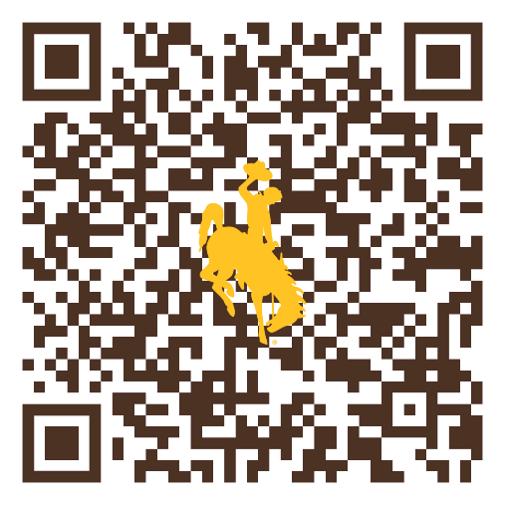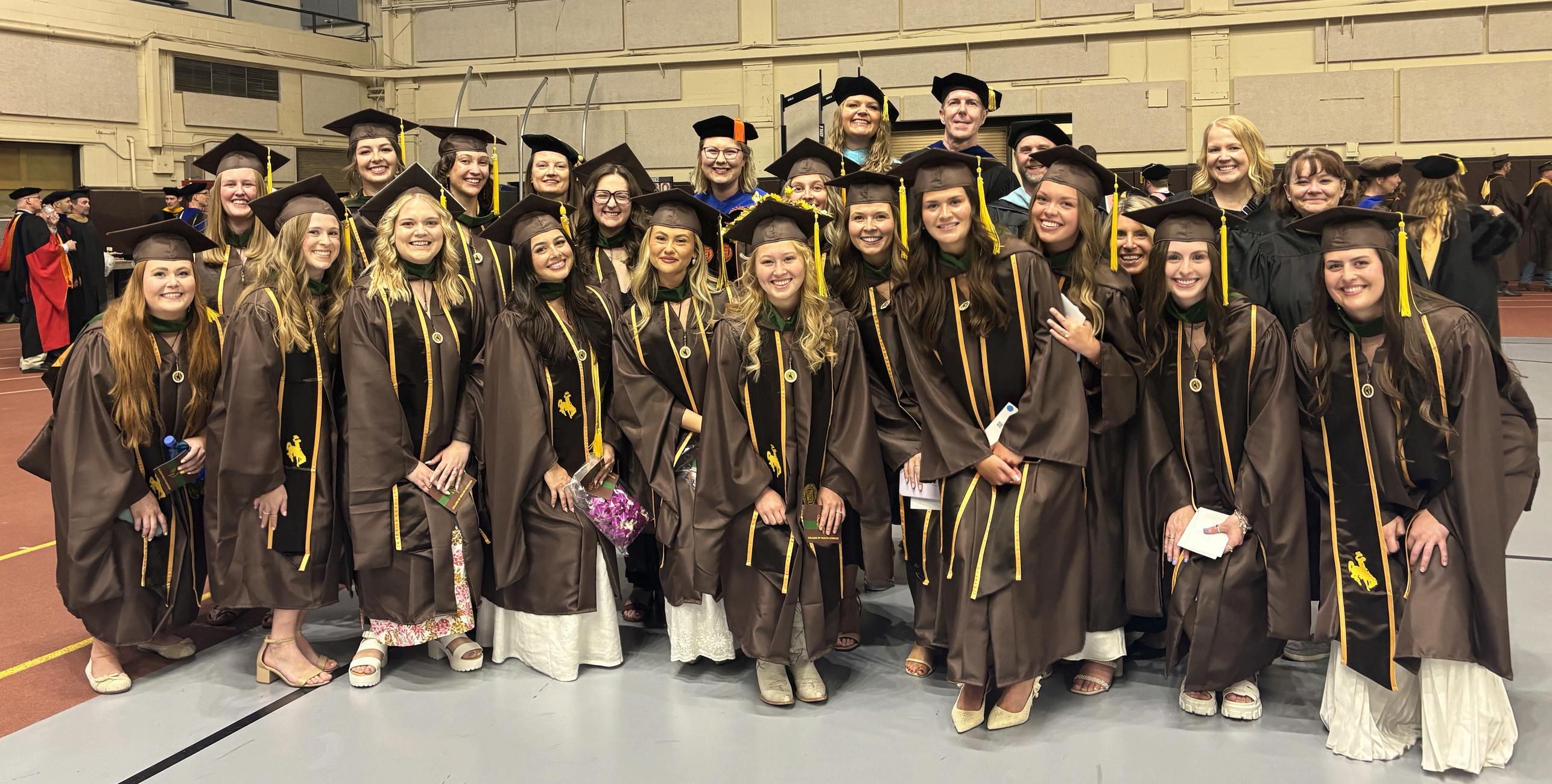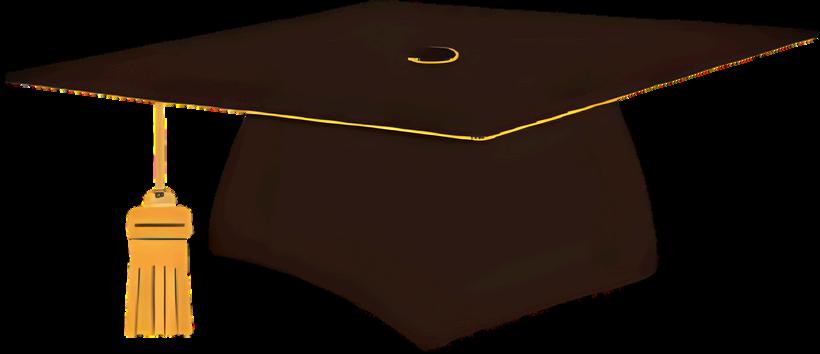
Mark Guiberson, PhD, CCC-SLP


Mark Guiberson, PhD, CCC-SLP
By: Mark Guiberson, PhD CCC-SLP
With the new school year around the corner, I want to share a few updates from UWYO ComDis We’ve got good momentum and a lot to be proud of
This fall, we ’ re welcoming 21 new students into the MS SLP program, our largest cohort yet They’re smart, motivated, and ready to get into the clinic We also wrapped up our 8-year CAA re-accreditation process last spring, and I’m happy to report the program was found in full compliance with no dings That kind of result doesn’t happen by accident It reflects the strong, steady work being done across the board by faculty, staff, students, and clinical partners.
Our guiding vision remains the same: to be a program of excellence with cutting-edge research, exceptional teaching and learning, and state-of-the-art clinical programs You’ll see evidence of this throughout the newsletter, and we’ll post our annual progress report on the website in September
I’ve got a few highlights to share Our faculty are getting noticed and receiving awards and grants, including alumna Kyliah Ferris and me receiving the Editor’s Award from Language, Speech, and Hearing Services in Schools (pictured on this page) We also have some incredible, innovative research to share Be sure to check out these accomplishments along with a summary of scholarships we ’ ve been able to award The Steve Elliott Scholarship in Communication has grown over the years thanks to Paul and Judy Lerwick, and our students are truly grateful for the support that honors Steve’s legacy You’ll also learn about the Dean and Iola Cosner Memorial Endowed Scholarship, a new fund with a remarkable backstory Thank you to ALL of our scholarship donors, our students couldn’t do it without your support!
We’re excited to welcome Dr Nora Gulick to the faculty and to introduce our new College of Health Sciences Dean, Patrick Hardigan, a Wyoming native who has already shown strong support for our work.
In May, we also said goodbye to Doug Petersen, who has moved on to a new position Doug was always on the go with his research, so we ’ re not surprised he’s on the move again While we’ll miss him, we ’ re also looking forward to welcoming new faculty who bring fresh energy and ideas to the program
August 2025

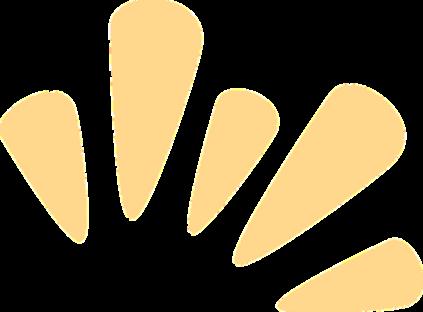
This year, we also lost a dear colleague and mentor, Dr Mary Jo Hidecker-Cooley, who passed away in February Mary Jo was deeply respected and loved, and she is missed by many
On the clinic front, we ’ re making a big move The UW Speech and Hearing Clinic is relocating to a newly remodeled space in the Mountain View Medical Park at 2710 Harney Street The new space includes upgraded instrumentation, enhanced video capture for teaching, three group treatment rooms, individual treatment rooms, a new audiology booth in a bold splash of blue, and a clinical instruction room where students will take classes The clinic will be easy to access and has plenty of parking, which we know matters A big thanks to Maggie and Dick Scarlett, whose support through the Scarlett Excellence Fund and other generous gifts made the remodel and technology upgrades possible. We’re aiming for a midSeptember opening and will host a Grand Opening and an Open House during the fall WYOSHA conference in Laramie
Signing off with a big thank you to all our off-campus supervisors and generous donors Your continued support makes our program truly exceptional

Interdisciplinary
New Supervisor: Elena Martinez
NIH Funds Dr Katelyn Kotlarek
Alumna: Leah Horst
and Iola Cosner: Deaf Pioneers
The Masters of Science (MS) education program in speechlanguage pathology {residential} at the University of Wyoming is accredited by the Council on Academic Accreditation in Audiology and Speech-Language Pathology of the American SpeechLanguage-Hearing Association, 2200 Research Boulevard, #310, Rockville, MD 20850, 800-498-2071 or 301-296-5700
Division of Communication Disorders Health Sciences, 265 1000 E. University Ave., Dept. 3311, Laramie, WY 82071
Phone: 307-766-6427; Email: comdis@uwyo.edu
Dr. Mark Guiberson, Director and Professor, UW Division of Communication Disorders
Kyle Moore, Graduate Assistant and Editor
Special thanks to all faculty and student contributors!
By: Hannah Young, M.S., CCC-SLP
At the University of Wyoming, we are proud to have a faculty composed of talented professionals with diverse areas of expertise, life experiences, and skills Yet, until recently, there was a notable gap The Division of Communication Disorders needed a faculty member with specialized expertise in adult acquired communication disorders someone who could both educate and mentor our students and advance impactful research in this area. Adding a faculty member with this expertise had the potential to not only impact the Division of Communication Disorders and College of Health Sciences at UW, but the Wyoming community as a whole Following a competitive search last Spring, Dr Nora Gulick accepted an offer to join the faculty as an Assistant Professor, and we are eager to introduce her to you and share the contributions she brings to this community
Dr Gulick’s research focuses on the communicative success and quality of life of people with aphasia across the rehabilitation timeline She initially became interested in this while volunteering as a communication partner with the Ohio State University Aphasia Initiative as an undergraduate student, a program that offers structured group therapy for people with aphasia Specifically, she was excited by the Life Participation Approach to Aphasia (LPAA) and how the approach emphasized functional activities that were engaging and meaningful for the group members As a result, Nora decided to pursue a career as a clinical researcher with a focus on aphasia. Following her undergraduate degree, she spent six years at Bowling Green State University earning her M.S. and Ph.D. in Communication Sciences and Disorders and a Graduate Certificate in Instructional Design.
When discussing her research interests and current projects, one thing became immediately clear: Dr Gulick is deeply passionate about her work Her overarching goal is to support people with aphasia in optimizing their life participation One way that Dr Gulick aims to accomplish this is by placing people with aphasia and their social networks at the center of her work She closely listens to their needs, considers their perspectives, and values their lived experiences For example, she is currently finishing a project that involved interviewing people with aphasia who are members of aphasia groups and experienced facilitators to better understand the impact of environmental and interactional factors in aphasia groups Although aphasia groups are growing in popularity and in efficacy, researchers have a sparse understanding of the aspects that make this approach effective


Dr Gulick shared, “The results of these studies will include actionable take aways as well as insights from the perspectives of people with aphasia and practicing clinicians that can be integrated into future research design” Dr Gulick also brings a strong commitment to teaching and a genuine dedication to supporting student development Dr Gulick works with undergraduate students in the LIFE (Language and Interaction for Functional Engagement) with Aphasia Lab to collaborate and engage in project planning, complete training on research protocols, and discuss the relation of the lab’s projects to their long-term goals as SLPs Currently, she also teaches Anatomy and Physiology of Speech and Hearing at the undergraduate level and Adult Neurogenic Disorders and Dysphagia in the graduate program. Dr. Gulick’s student, Shelby Ramage, shared, “Working with Dr. Gulick in her lab has been so beneficial in preparing me for graduate school. Through it, I have been able to expand my knowledge on aphasia and the use of aphasia groups as treatment”
As an early career professional, Dr Gulick has already achieved several notable accomplishments She has presented her work at state, national, and international conferences alongside her collaborators She has received funding from the Bowling Green State University Optimal Aging Institute, the ASHA Advancing Academic-Research Careers award, and most recently, two 2025 UW Faculty Grant-In-Aid Seed Money awards In describing her first year at the University of Wyoming, Dr Gulick stated, “I have found all my colleagues to be full of passion for their own work and interested in supporting each other and the students we get to teach and work with It has been wonderful to join a team that is focused on collaboratively contributing to enhanced access and quality of healthcare services in Wyoming and beyond”
By: Nora Gulick, PhD CCC-SLP
Here in the Division of Communication Disorders we are continually striving to stay ahead with cutting edge technology as we work towards our mission of advancing the science behind practice and developing practice ready speechlanguage pathologists Dr Zoe Kriegel, assistant professor and director of the SEAK Lab (Speech Electromyography, Acoustics, and Kinematics Lab) is one member of the division leading the way with her work applying artificial intelligence (AI) in research on speech motor control Dr Kriegel has begun this line of work as an interdisciplinary collaboration with Dr Diksha Shukla, an assistant professor in the College of Engineering and Physical Sciences Dr Shukla brings expertise in the area of machine learning and computer vision to this collaboration This spring Drs Kriegel and Shukla were awarded $30,000 in seed funding for their work as a part of the University of Wyoming AI Initiative This seed funding specifically came from the University of Wyoming Research Excellence Reserve Account, which in the past year has been focused on supporting the application of AI in faculty members’ research In total, the program provided about $337,000 in funding to support efforts across the university Over the next year, Drs Kriegel and Shukla will complete their interdisciplinary project titled Tracking Facial Movements: Using AI For Rural Telehealth Speech Therapy. This work will build an important scientific foundation for improved diagnosis and treatment of speech changes in people living with Parkinson disease By leveraging AI techniques with widely available consumer device cameras, like those on phones, tablets, and computers, Drs Kriegel and Shukla’s work will support speech language pathologists in diagnosing motor speech disorders earlier and more accurately Their application of AI to track the facial movements of people living with Parkinson disease could also lead to objective treatment outcome measures and the capacity to provide precise feedback as a client is speaking during treatment sessions or home practice
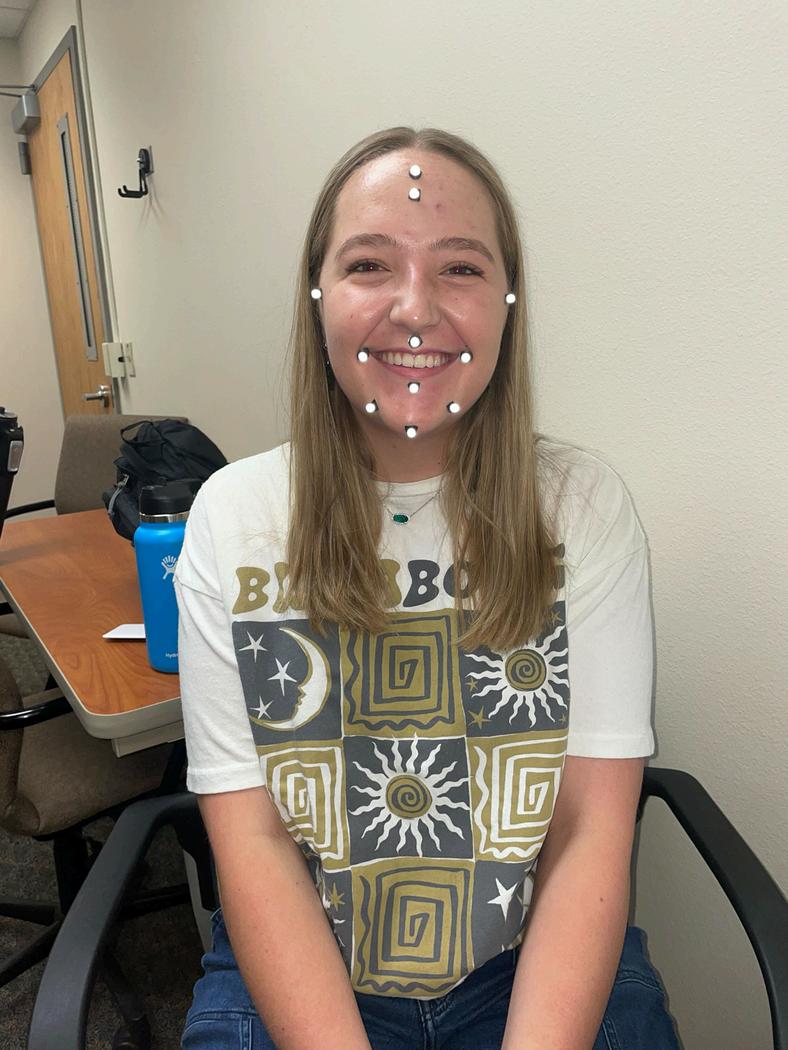
Caption:Faceskeletoncreatedformeasuringinperson,specializedspeechkinematicsdepictinga speaker'sskull,chin,andoralopening These dataarecapturedusingreflectivemarkersand specializedcameras Whilethesedataarehighly precise,theiruseinclinicalpracticeislimitedby therequirementsfordedicatedspace,specialized training,andthecostoftheequipment TheAI projectaimstousethesein-person measurementstodevelopandrefinetelehealth measurementsusingwidelyavailablecamerason volunteers'phones,tablets,orlaptops Pictured: AllisonGregory-SEAKLabresearchassistant
left to right: Dr Zoe Kriegel, and undergraduate research assistants Amber Nelson, Liam O’Harra, and Violet Davydzenka at the Spring 2025 Parkinson’s Prom, a fundraising event for the Laramie’s Parkinson’s Group.
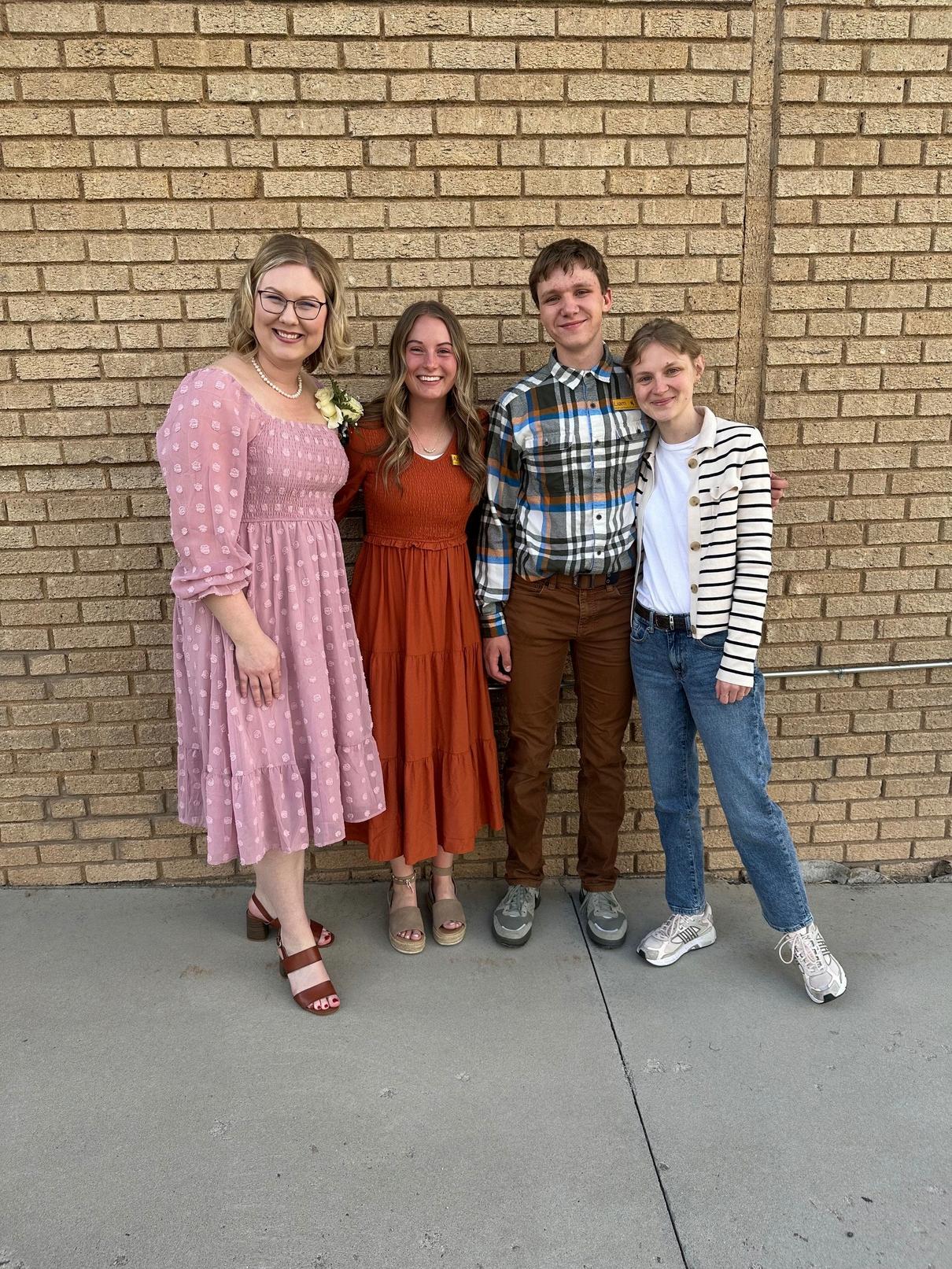
Movement analysis technology has been available for decades, but it has been inaccessible for use in clinical practice We hope that leveraging accessible technology can support speech language pathologists in the early and accurate diagnosis among different types of motor speech disorders.” As the work progresses, the findings could impact the lives of the 70-90% of people living with Parkinson disease who will experience changes to their ability to speak. It will be especially impactful to those living in Wyoming and other rural states and communities where in-person access to therapy is a barrier
By focusing on applying AI with everyday technology that is accessible to most people, Drs Kriegel and Shukla are positioning their work to expand access to individualized and evidence-based speech therapy "With the availability of personal cameras in our everyday devices, we hope to explore how individuals might be able to use this technology during everyday conversations Feedback from technology has the ability to reduce the burden on speakers and listeners impacted by a motor speech disorder and reduce the frequency of miscommunications” In addition to the impact this work will have on those living with Parkinson disease whose treatment will be enhanced, this project is getting undergraduate students involved with meaningful research as a part of their education and preparation.
Allison Gregory, a research assistant in the SEAK Lab shared about her experience stating that, “I have learned about the current limitations of auditory-perceptual assessment, such as a reliance on clinical experience, and what is gained through the use of kinematic assessment I have also gained a much better understanding of experimental design, which will help me as I continue to graduate school and as I develop my master's thesis Eventually, I hope to help change accessibility for standards of diagnosis and disease progression”
By: Corri Sandoval, M.S., CCC-SLP
ElenaMartinez (Fresquez) graduated with her undergraduate degree in Speech and Hearing Sciences from the University of Wyoming in 2001 and continued her education to receive her master’s degree in Communicative Disorders from San Diego State University (don’t worry- as much as she loved SDSU, she’s still a Cowboy fan through and through!) in 2004 Spending time in California, and across the country as a travel SLP,Elenahas had the opportunity to work in a variety of settings including skilled nursing, elementary education, home health, outpatient rehabilitation, and with a few private clients as well After working for many years in the K-6 school setting in California,Elenamoved back to Laramie with her husband and two children in 2017 During the past 8 years,Elenahas enjoyed her time as an SLP in the school setting (elementary to high school) and part-time for a few years as a clinical supervisor at the University of Wyoming Speech and Hearing Clinic.

Throughout her career,Elenahas provided supervision to SLPAs, CFYs, and graduate students at her work sites and the UWSHC “As I jumped into my career and reflected on my quality supervisors over the years, I knew at some point I wanted to ‘ pass the torch’ of supervision”Elenaenjoys being a part of the education and learning experience of SLPs in all phases of their education, which can challenge her as well! Reflecting on the knowledge base from a first semester graduate student all the way to a CFY keeps her on her toes She values that she can bridge the gap between coursework and working directly with clients, as well as teaching the practical aspects of a career as an SLP “I truly appreciate that I can offer my years of experience and at the same time gain knowledge from my students with their current studies, fresh ideas, and enthusiasm”Elenaalso finds it valuable to remind students of all the opportunities to learn and grow. “Our field is so vast. I think it’s important to really talk with students about how we can continue to learn and grow in this field, from the first year to year twenty! It’s always good to ask questions, research, and collaborate with other SLPs as you ’ re never going to know it all This is what makes our field exciting”
By: Nora Gulick, PhD CCC-SLP
Dr Katelyn Kotlarek has marked her early career with a plethora of accomplishments including publishing over 30 research articles focused on cleft palate and craniofacial differences; earning over $800,000 in funding for her work; and earning a range of awards for her research contributions including the American Speech-Language-Hearing Association Early Career Contributions in Research Award, the American Cleft Palate-Craniofacial Association Emerging Leader Award, and the UW Presidential Scholarly Achievement Award Her impressive trajectory continued through the 2024-2025 academic year Not only was Dr Kotlarek awarded tenure and named as a President's Distinguished Scholar, but she was awarded an R21 research grant from the National Institute on Deafness and Other Communication Disorders (NIDCD) to study precision medicine for infants with cleft palate This work will build from Dr Kotlarek’s research thus far which has focused on characterizing typical and atypical velopharyngeal anatomy and determining the impact of primary palatoplasty, a surgical procedure used to repair a cleft palate, on the velopharyngeal mechanism Research on cleft palate, a birth defect affecting approximately 1 in 700 children, is essential as this condition leads to delayed development of intelligible speech due to the characteristic velopharyngeal insufficiency, or poor segmentation of the nasal and oral cavities
The NIDCD is a part of the National Institutes of Health (NIH) The R21 research grant is a highly competitive mechanism that supports exploratory and developmental research projects in communication sciences It is designed to encourage high-risk, high-reward studies that may lead to breakthroughs That is exactly what Kotlarek’s project is positioned to do Over a three year period Dr Kotlarek will complete her funded project, Using MRI to Facilitate Precision Medicine for Infants with Cleft Palate which was awarded more than $500,000 of support. This project will utilize a novel combination of magnetic resonance imaging and home-based speech recordings before and after palate repair surgery Data will support identification of mechanisms for surgical procedure selection and early speech monitoring processes The results of this project could provide more patient-specific interventions and monitoring procedures to improve outcomes
That will be especially impactful for the 80% of children with a reconstructed palate who require speech therapy and nearly 40% who currently require additional surgeries to support adequate velopharyngeal closure
Like most important work, Dr Kotlarek is pursuing this project with a highly qualified team The interdisciplinary team includes Dr Gregory Allen, an Otolaryngologist, and Dr Ilana Neuberger, a radiologist, who are both from Children’s Hospital Colorado, University of Colorado Anschutz Medical Campus Additionally, the team includes Dr Kate Bunton, a speech pathologist and speech science researcher from the University of Arizona. Here at the UW Division of Communication Disorders we cannot wait to see the impact from the important work this team does!

By: Amy Peterson, PhD CCC-SLP and Alexxis Motisi, B.S.
Leah Horst attended the University of Wyoming for her undergraduate degree She is still close professionally and personally with several people from her UW ComDis cohort
Some of Leah’s favorite memories from her time at UW are ordering dinner at Blimpie’s Sandwich shop using American Sign Language, studying for Anatomy and Physiology of Speech tests in the union, “practicing” determining developmental ages while “people watching” after a challenge by Dr Gavin (the professor for Language Development at the time), helping in the language transcription lab, and being part of a group of people who loved to talk as much as she did After a visit to UW last fall, Leah was very impressed with the cutting-edge research the faculty is conducting, along with the opportunities for students to participate in that research
Leah’s journey to be an SLP started when she read about the field in a book. She knew that she wanted to be in a helping profession and says that she stumbled upon speech-language pathology after reading a single paragraph and falling in love with the idea of helping people communicate. Leah has worked in a number of settings

Leah’s early career took her from skilled nursing facilities in eastern Nebraska to an Early Intervention (birth to 3) program in Milwaukee, Wisconsin In 2000, she returned to Laramie, WY and worked at the Developmental Preschool and Day Care (birth to 5) until 2014 She is known in our community as a kind, thoughtful, and effective early interventionist In 2015, she joined Mountain West Speech Services in Cheyenne, WY serving children from birth to 21 years of age At Mountain West, Leah has had the opportunity to work with children and their families with a wide variety of diagnoses and needs Leah’s passion is helping parents and caregivers understand their child’s diagnosis by sharing new strategies and tools to help their children communicate There is nothing better than hearing from an excited parent that their child has used a new word, phrase, or skill Equally exciting is seeing the pride on a child’s face when they know they have accomplished something that was previously daunting. Leah has also supervised several graduate students from UW because she wants to give back to the field. She was fortunate to have amazing supervisors in her training and wanted to give upcoming SLPs the same opportunities In addition to helping graduate students apply what they have learned in school, she likes that students get to experience realities of working with children and families Helping graduate students process situations that arise in family partnerships for early intervention is part of the clinic training process Leah advises new SLPs, “Make as many connections as you can with other SLPs, both where you are working and across the county Ask questions, don’t be afraid to admit you don’t know something, that you need help, or that you would like input on how to approach a particular client Know that some days will be harder than others Above all, have fun and keep learning!” Leah has been a long-standing member of the Wyoming Speech-Language-Hearing Association (WyoSHA) and is proud to be the current president elect Wyoming geography and small population can make it hard to connect with other SLPs Membership and participation in WyoSHA events and activities has given her the opportunity to collaborate with other SLPs and Audiologists across the state. Her new role on the WyoSHA board is giving her the opportunity to help advocate for the field within the state and help connect members with resources to make their jobs easier
By: Esther Hartsky, M.A.
The Dean and Iola Cosner Memorial Endowed Scholarship honors the lives and legacy of Dean and Iola Cosner, who both became Deaf at a young age They met at the Nebraska School for the Deaf in Omaha and got married in 1950 After moving to Dean’s family ranch in Wyoming, they dedicated their lives to raising a family and fostering a vibrant Deaf community Through their efforts, they established social groups and promoted American Sign Language (ASL) and Deaf culture across Wyoming Sons, Barney, Danny, and John Cosner set up the scholarship I recently had the chance to catch up with Barney and learn more about Dean and Iola and their lives in Wyoming
Barney Cosner's Reflections:
1 Can you share a little bit about your background and how your parents' lives influenced your own?
Dean and Iola's journey began at the Nebraska School for the Deaf, where they met and married. Their move to Wyoming was challenging, especially as Deaf individuals, due to its isolation However, they overcame these challenges by forming social groups and creating a cherished Deaf community throughout Wyoming They remained connected to their roots by attending reunions at the Nebraska School for the Deaf annually Dean had an exceptional ability for woodworking and could determine mechanical issues by placing his hand on a tractor or vehicle motor while it was running
2 What was your relationship with your parents like, and how did their experiences as Deaf individuals shape your upbringing?
Growing up as a Child of a Deaf Adult (CODA), as the oldest, I had to be the translator for my parents From a young age, I interpreted for my parents as early as five or six years old At local events like fairs, I would interpret for my father Communication was facilitated through notepads and pens, which my dad was never without Dean and Iola actively sought out other Deaf individuals in the state, starting with a dentist in Sheridan who could sign and knew of a Deaf couple in Sheridan, WY. Their efforts led to the formation of a camping club called "Talking and Flying Hands" and, through the Wyoming Bison Camping Club, brought the Deaf community closer together Dean was also actively involved in the National Association for the Deaf (NAD)
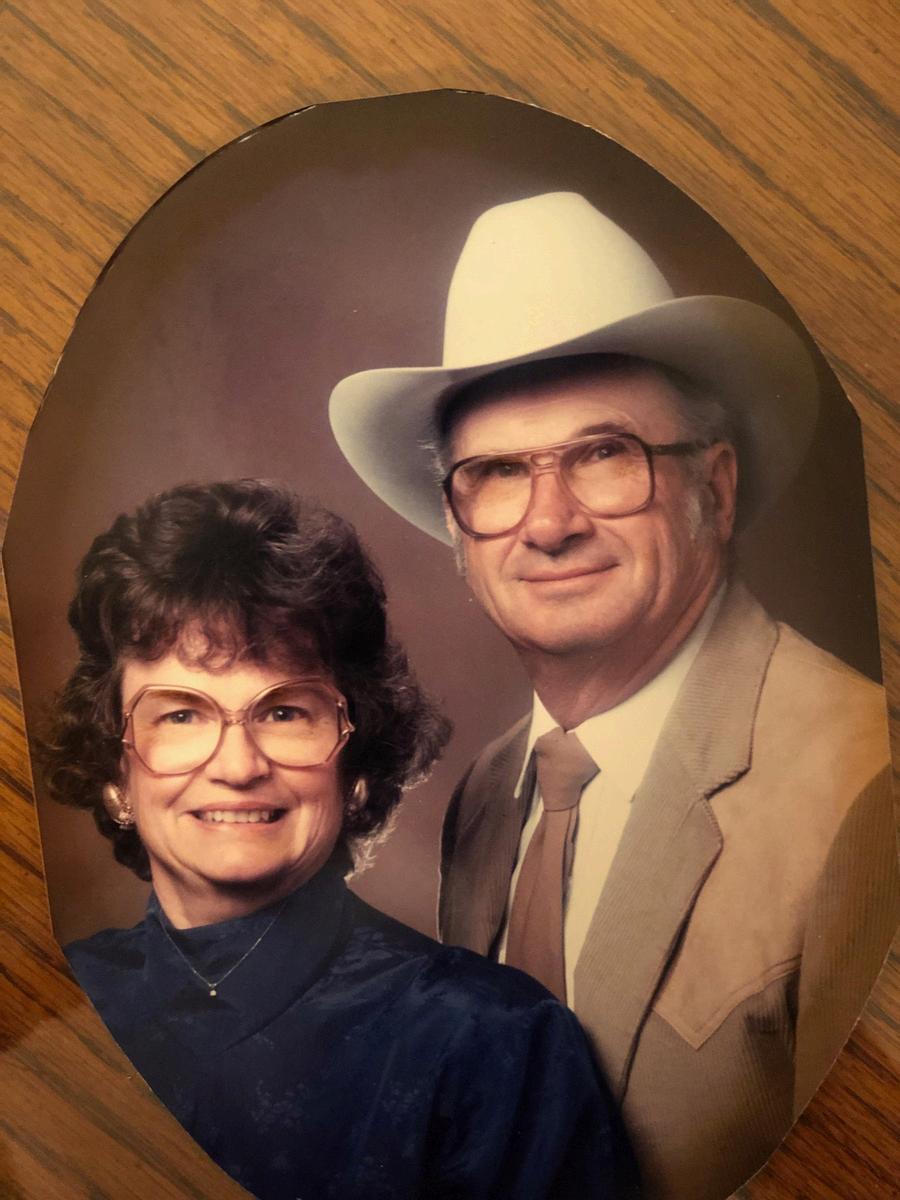
3. What aspects of your parents’ lives or experiences do you hope this scholarship will help preserve or continue?
Interpreters are scarce, particularly in Wyoming I hope this scholarship will increase the availability of resources for Deaf and Hard of Hearing individuals in Wyoming to enhance their lives
4. What message would you like to send to the students who will benefit from this scholarship?
Immerse yourself fully in this program Engage with enthusiasm, work diligently, and strive for excellence and proficiency in the ASL language Learning ASL and understanding Deaf culture offers numerous benefits for numerous people
5 How do you hope this scholarship will help preserve their legacy for future generations?
Dean and Iola's legacy is one of resilience in Western and Wyoming culture. They demonstrated that Deaf individuals can live and thrive in the Wyoming lifestyle, with communities for support.
6. What do you hope your parents would say about this gift you’ve made in their memory?
With deep emotion, I wish my parents were here to witness this We hope our dad and mother would be very pleased with this endowment gift toward the ASL Studies Certificate program, as it aligns with dad’s lifelong dedication to the Deaf community in Wyoming
Cosner Brothers (left to right): John D. Cosner, Danny J. Cosner, Barney L. Cosner
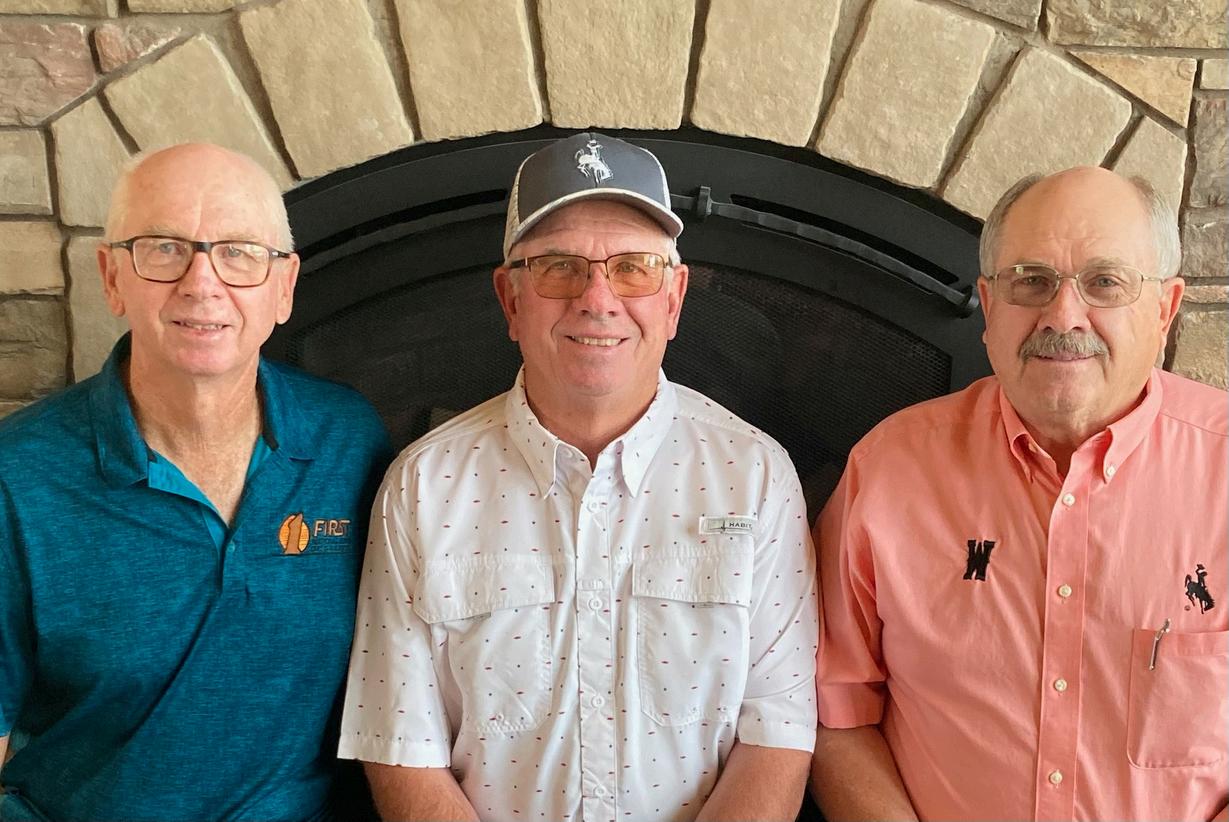

By: Hannah Young, M.S., CCC-SLP
We are saddened to share that our beloved colleague and friend, Dr. Mary Josephine Cooley-Hidecker, passed away on February 11th, 2025. Dr. Cooley-Hidecker joined the Division of Communication Disorders at the University of Wyoming in 2013. During her time as an assistant professor at UW, Dr. Cooley-Hidecker influenced the lives of many individuals Whether she was leading a lecture on aural rehabilitation or augmentative and alternative communication, mentoring students in her research lab, contributing to the development of Project Echo in the Wyoming Institute for Disabilities (WIND), or simply providing encouragement to a student in need, Dr Cooley-Hidecker brought warmth, humor, and optimism to everything she did
Dr Cooley-Hidecker was an esteemed educator and researcher, but perhaps what set her apart from most was her ability to make people feel supported and valued Students knew her as a trusted guide through their educational career This was made transparent in the hundreds of Facebook comments, many from prior students, left on the announcement of her passing One Wyoming student shared, “Dr Hidecker was instrumental in my success as a student and beyond She always saw me for more than I ever did She’s the reason I pursued so many different opportunities and why I continue to ask questions in all areas of my life.” Another commented, “She inspired me to take risks, do my best, and was always so supportive of my dreams, even when my path was unconventional.” On a personal note, I had the privilege of working with Dr. Hidecker as my research mentor, and it is an experience I will always treasure She sparked my passion for supporting individuals with complex communication needs and supported me as I made life-changing decisions about my academic and professional careers


Dr Hidecker advocated for me in and out of the classroom to provide me with access to the most meaningful learning opportunities Being a part of her lab was being a part of a community, and I am grateful to have had that experience In addition to her time spent at UW, she served as faculty at the University of Central Arkansas and most recently, the University of Kentucky Her clinical research aimed to improve evidence-based practices for those with complex communication needs, especially in the areas of autism and cerebral palsy She led the development of the Communication Function Classification System Tool and continuously investigated best practices in augmentative and alternative communication (AAC).
Though Dr. Cooley-Hidecker is no longer with us, her impact continues through the professionals she trained, the knowledge she shared, and the warmth she gave so freely She is survived by her husband and two daughters, whom she loved greatly We’ll always think of Dr Cooley-Hidecker as a Cowgirl at heart and a member of our family
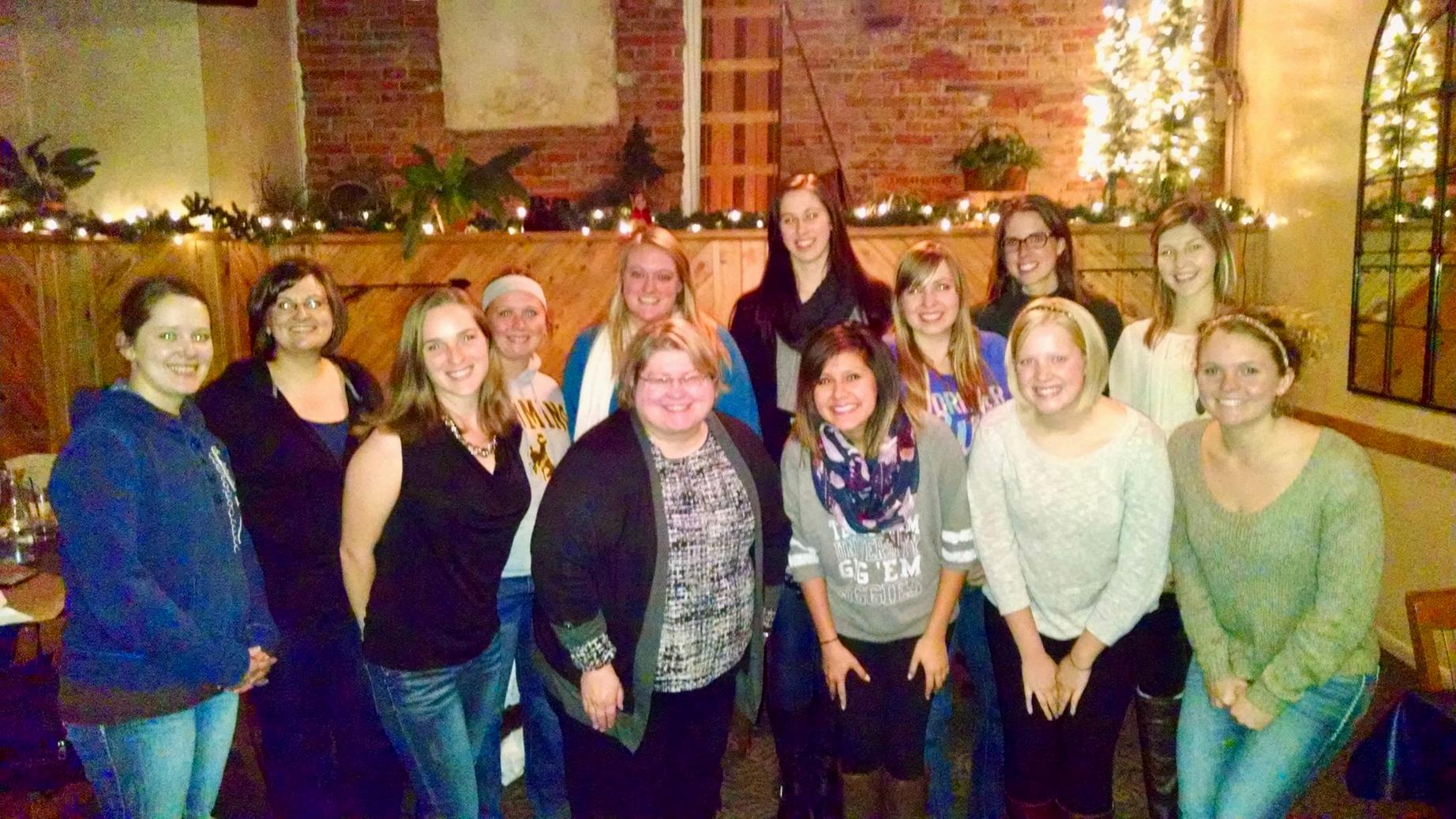
By: Amy Peterson, PhD CCC-SLP and Kelsi Angelovich, B.S.
The University of Wyoming’s chapter of the National Student Speech-Language-Hearing Association (NSSLHA) partnered with the Wyoming Speech-Language-Hearing Association (WyoSHA) to host a “Legislative Lunch and Learn” at the Wyoming State Capitol in Cheyenne in January NSSLHA students, WyoSHA members, and community participants gathered to share information about the lifelong impact of Developmental Language Disorders (DLD) over lunch with state legislators
Amy Peterson, WyoSHA president and assistant professor with the UW Division of Communication Disorders, was awarded a State Association for Student Advocacy grant from the American Speech-Language-Hearing Association (ASHA) This grant is available to state associations interested in developing/increasing student participation in State Advocacy Day activities States are highly encouraged to work with NSSLHA chapters to increase interest and participation in advocacy efforts for communication disorders specialistsspeech-language pathologists and audiologists - and the wide variety of clients that they serve
The Legislative Lunch and Learn event was well attended by undergraduate and graduate students, WyoSHA members, retired SLPs, and community members. NSSLHA helped organize the event by creating infographics about the impacts of DLD in different phases of life, designing t-shirts and swag to promote the organizations, sharing information with legislators over lunch about communication disorders, and giving two well-organized presentations during the 3-hour event at the Capitol It was great to see our students in action! Nearly all of the NSSLHA officers and many students were able to attend this event
“ADVOCACY DAY MEANT A LOT TO ME BECAUSE IT WAS A TIME TO ADVOCATE FOR A FIELD THAT I AM VERY PASSIONATE ABOUT. DEVELOPMENT LANGUAGE DISORDERS ARE NOT TALKED ABOUT ENOUGH, SO IT WAS AMAZING TO GO ADVOCATE AND EDUCATE FOR IT TO STATE LEGISLATORS.”
Mikayla Smith, the UW NSSLHA president
Marisol Blazovich, NSSLHA vice president, shared, “Advocacy Day was a great day for our speech path members and NSSLHA officers to have a chance to show their knowledge on Developmental Language Disorders I was lucky enough to help create some deliverables for the day and it was rewarding to share the impact that speech pathologists can have through the lifetime”
Creating an opportunity for students and the community to come together, share knowledge, and participate in Advocacy Day fosters collaboration, raises awareness, and empowers individuals to advocate for meaningful change Kelsi Angelovich, a senior and NSSLHA member said, “Participating in this event helped me realize how important it is to come together as a community and stay involved. Being able to educate and advocate for others and myself as a future SLP was amazing. Events like this help build essential advocacy and leadership skills and create connections with professionals and policymakers” Students' takeaways from this experience highlight the importance of events such as the Legislative Lunch and Learn, partnering with WyoSHA, and the benefits of being awarded an ASHA grant
The focus of this year ’ s advocacy activity was to raise awareness about DLD and the lifelong impact of language disorders on social, academic, professional, and occupational performance DLD affects approximately 75% of the population and is present in all languages, socioeconomic groups, and cultures This percentage is equivalent to roughly 1-2 students in every classroom Abby Thompson, a senior and NSSLHA secretary, shared, “Advocacy Day was an opportunity for me to get involved in raising awareness about Developmental Language Disorder, but it provided so many other opportunities as well! It was an opportunity for me to learn more about DLD, to dive deeper into a challenge that is faced by people in our community, and to present those challenges and concerns to the public. It was a day to stand up and speak out on behalf of those that might not be able to.”
Allyson Visocky, a junior, shared a similar experience, saying, “My biggest takeaway from this event is that it is always important to be involved to make sure we can not only advocate for our profession, but for the people that we serve It was a great experience being able to talk with different legislative leaders about what they do and what we do on a daily basis I found it super interesting that many people don't know the full scope of our practice and all the different avenues that you can go down when you become a speech pathologist”
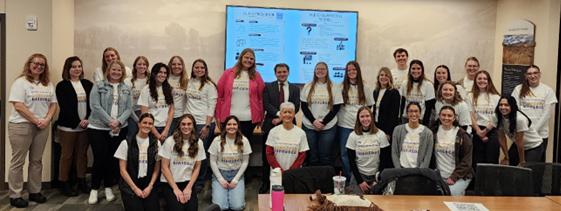
Photo: UW NSSLHA and WyoSHA members pose for a picture during a Legislative Lunch and Learn Advocacy Event with Wyoming Secretary of State Chuck Gray (Back row, wearing suit and tie) with Amy Peterson (standing left of Gray).
Photo credit: K. Shanahan Peterson
The WyoSHA mission is to connect speech-language pathologists and audiologists across Wyoming through advocacy, public awareness, and professional development while promoting integrity and leadership WyoSHA aims to provide a direct link for Wyoming professionals to the national organization (ASHA) and to act as a voice for change by interacting with state representatives, senators, and legislators WyoSHA also supports the development of future speech-language pathologists, audiologists, speech-language pathology assistants, and audiology technicians through scholarships and reduced membership costs for first-year practitioners.

The National Student Speech Language Hearing Association (NSSLHA) is the only national student organization for preprofessionals studying communication sciences and disorders (CSD) recognized by theAmerican Speech-Language-Hearing Association(ASHA) Established in 1972, NSSLHA supports nearly 11,000 members and 350+ chapters at colleges and universities nationwide NSSLHA’s mission and vision support students: success starts with National NSSLHA We inspire, empower, and support students in the field of CSD We give you the tools to navigate your academic career while preparing you for your professional one. Whether it’s giving you unparalleled leadership opportunities, access to peer-reviewed academic journals, or giving you financial support as you start your professional career, National NSSLHA is the preferred home for students in CSD


Hedi Clark – College of Health Sciences Golden Teacher Award
Mark Guiberson – American Speech-Language Hearing Association, Certificate of Recognition for Special Contributions in Multicultural Affairs
Mark Guiberson – Language, Speech, and Hearing Services in the Schools, Editor’s Award for the article Native American Caregiver-Child Shared Book Reading Interactions: A Descriptive Study and Integrative Review
Nora Gulick – ASHA Advancing Academic and Research Careers Award
Nora Gulick – 2025 UW Faculty Grant-In-Aid Seed Money
Nora Gulick – 2025 UW Faculty Grant-In-Aid Self-Contained Proposals
Esther Hartsky – Promoting Intellectual Engagement in the First Year (PIE) Award 2025
Katelyn Kotlarek – University of Wyoming Faculty Grant-In-Aid Seed Money (2025-2026)
Katelyn Kotlarek – National Institute on Deafness and Other Communication Disorders Early Career Research Award R21 (2024-2027) “Using MRI to facilitate precision medicine for infants with cleft palate”
Katelyn Kotlarek – 2024 Pediatric Plastic Surgery Association Best Pediatric Paper of the Year (for Kotlarek KJ, Sitzman
TJ, Williams JL, Perry JL Nonsedated Magnetic Resonance Imaging for Visualization of the Velopharynx in the Pediatric Population Cleft Palate Craniofacial Journal 2023;60(2):249-252)
Katelyn Kotlarek – American Speech-Language-Hearing Association Award for Early Career Contributions in Research
Katelyn Kotlarek – University of Wyoming President’s Distinguished Scholar (2025-2027)
Zoe Kriegel – University of Wyoming Presidential Scholarly Award for Early Career Faculty
Zoe Kriegel – College of Health Sciences Research Award
Zoe Kriegel – 2025 Faculty Grant in Aid Seed Money, Artificial Intelligence
Amy Peterson – College of Health Sciences Service Award
Amy Peterson – Mortar Board Society Top Prof Award
Amy Peterson – UW Early Career Graduate Mentor Award Nominee

Guiberson, M, & Moore, KB (2024) Strengthening Early Language Skills in Young Diverse Learners: A Scoping Review of Culturally Responsive Approaches Communication Disorders Quarterly, Online first
Gulick, E., Archer, B, & Leaman, M C (2024) Using discourse structure analysis to understand communication profiles of members with severe and mild aphasia in facilitated conversation groups Topics in Language Disorders, 44(3), 201-221
Peterson, A. K. & Ukrainetz, T A (2025) Examining the social validity of Sketch and Speak expository intervention for adolescent students, their parents, and their speech-language pathologists Language, Speech, and Hearing Services in Schools https://doiorg/101044/2025 LSHSS-24-00079
Power, S J, Piccorelli, A V, Jones, D L, Neuberger, I, Allen, G C, Barhaghi, K, & Kotlarek, K J (2024) Craniofacial and Velopharyngeal Dimensions in Infants 012 Months: Between- and Within-Group Differences Based on Age and Sex Journal of Speech, Language, and Hearing Research, 67(10), 3579–3594 https://doiorg/101044/2024 JSLHR-24-00084
Kriegel, Z., Fullenkamp, A. M., & Whitfield, J. A. (2025). Speech Kinematics and Perioral Muscle Activity Are Influenced by Stroop Effects. Journal of Speech, Language, and Hearing Research, 1-19.
Benton-Vitz, B, & Krueger, B. I. (2024) The effect of motivational interviewing on caregiver facilitation of home practice In Seminars in Speech and Language Thieme Medical Publishers, Inc Online first

We’d like to thank and acknowledge donors for a very successful year!

For the 2025–26 academic year, the Division of Communication Disorders awarded $57,500 in scholarships to support our students' academic and professional goals. Twenty-two students received scholarships this year!
We extend our sincere gratitude to the generous donors who made this possible through the establishment of the following scholarships:
Steve Elliott Communication Disorders
Scholarship (endowed)
Dean and Iola Cosner Memorial Scholarship (endowed)
Dr. Thom and Terry Flamboe Graduate Fellowship in Speech-Language
Yagi Multicultural Scholarship in Communication Disorders
Lyric River Memorial Scholarship

Alena C. Andersen, Katie M. Babbitt, Douglas and Cheryl Baker, Jessica H. Baker, Vicki L. Bernard, Elena Brazzero, Janet L. Brook, Nancy and Gordon Bryson, Jonathan and Katelyn Cabrera, Julianne Cabrera, Justin Cabrera, Ellie Candler, Jason Candler, Barney L. Cosner, Danny and Carleen Cosner, John and Margaret Cosner, Bhausaheb Kashinath Dhokale and Shital Shinde, Katelynn J. Doherty, Carolyn A. Dorn, Cayden Ferrin, Mark and Teresa Garcia, Shelley Gosa, Ann Guiberson, Frank and Susan Guiberson, Mark Guiberson, Nora Gulick, Robyn A. Hardesty, Matthew E. Hatton, Jill A. Highman, Michelle L. Hilaire, Blade and Megan Hodges, William L. Hodges, Brian and Leah Horst, Gus Howard and Madison Marces, Alice and Henry Hunter, Mark and Elyse Johnson, Zoe Kriegel, Breanna I. Kruegar, Gladys E. Larson, Toby and Nancy Marlatt, Luke Martin and Kelly Dene, Debbie and Marty Martinez, Kristin A. Morrison, Clyde and Sandra Owen, Lisa M. Owen, Austin A. Palmer, Gregory T. Pratz, Randy and Clancee Rea, Robert T. Rimac, Rosa Rios, Dick Scarlett III and Maggie Scarlett, Edward and Mary Schaub, Robert and Diane Seville, Sahala and Ryan Shoemaker, Suweksha Shrestha, Kamma D Slaughter, Simalee Smith-Stubblefield and William Stubblefield, Bryce and Tess Snow, Jessica and Justin Stugart, Rainer and Tyler Weeks, Connie Williams, Jay P. Wuensch, Marisa C. Yagi
We sincerely thank you, our valued alumni and friends, for your continued support of the University of Wyoming Division of Communication Disorders. Your generosity strengthens our commitment to excellence in scholarship, research, and endowment. With your support, we continue to provide meaningful opportunities that enrich the academic and professional growth of our students.
WONDERING HOW YOU CAN MAKE YOUR GIFT OF SUPPORT GO DIRECTLY TO YOUR SPECIFIC AREA OF INTEREST?
